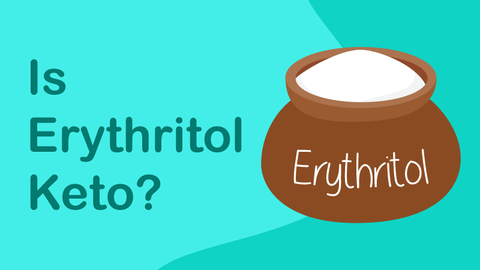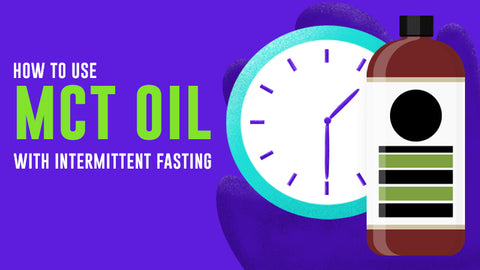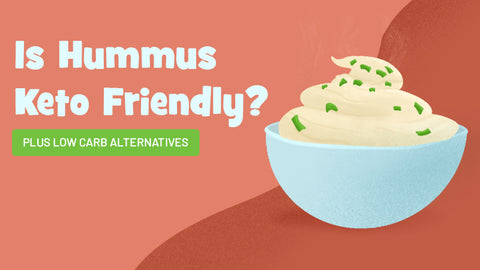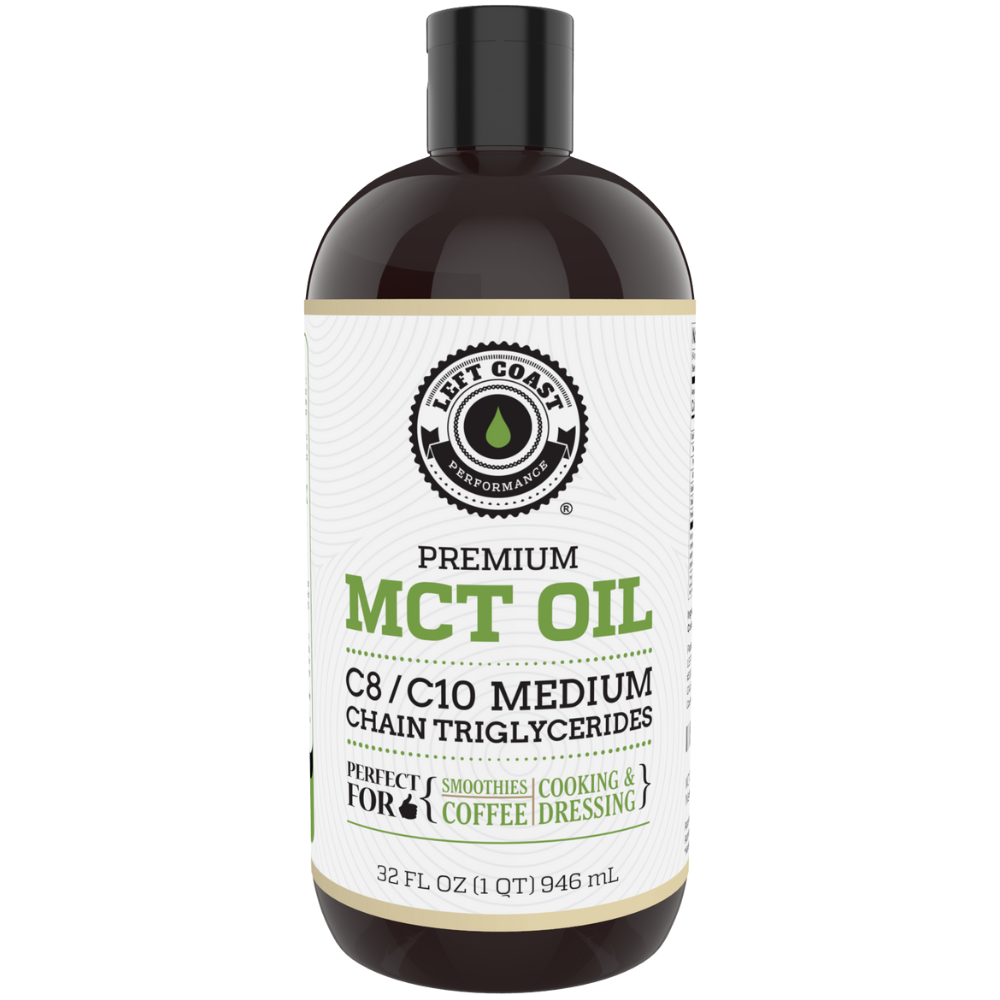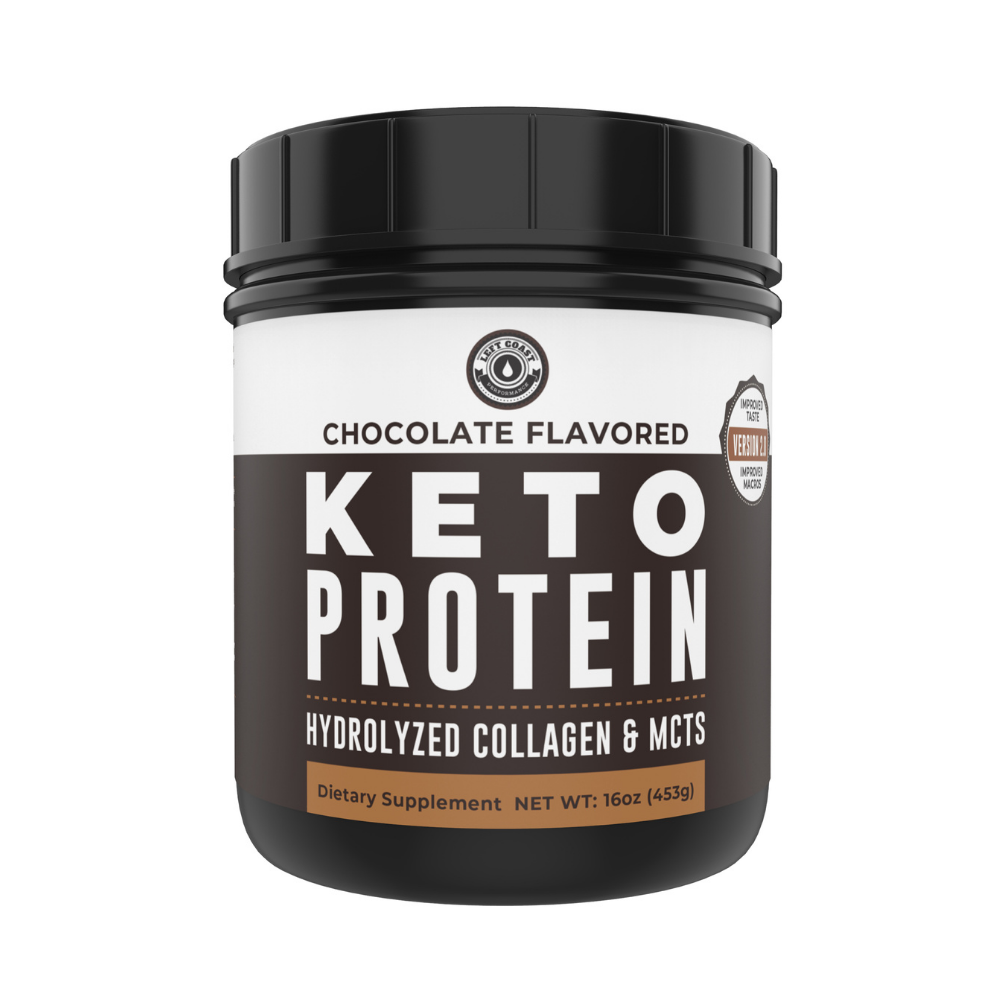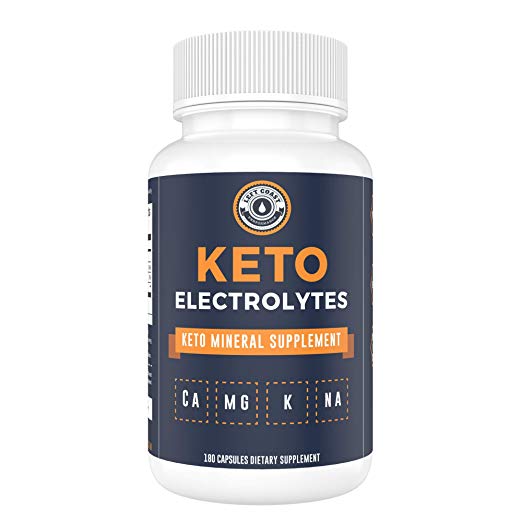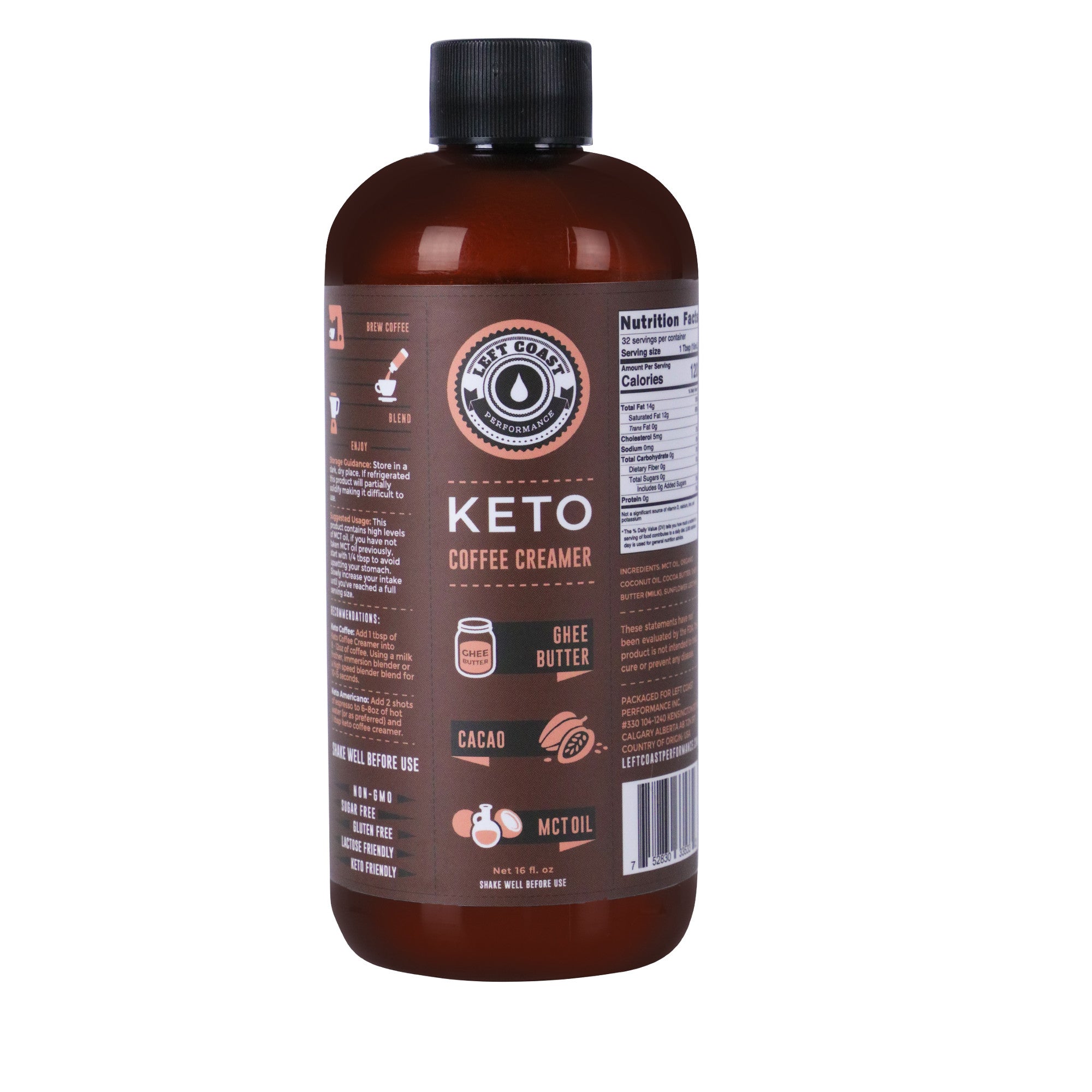Best Protein Powder for Keto
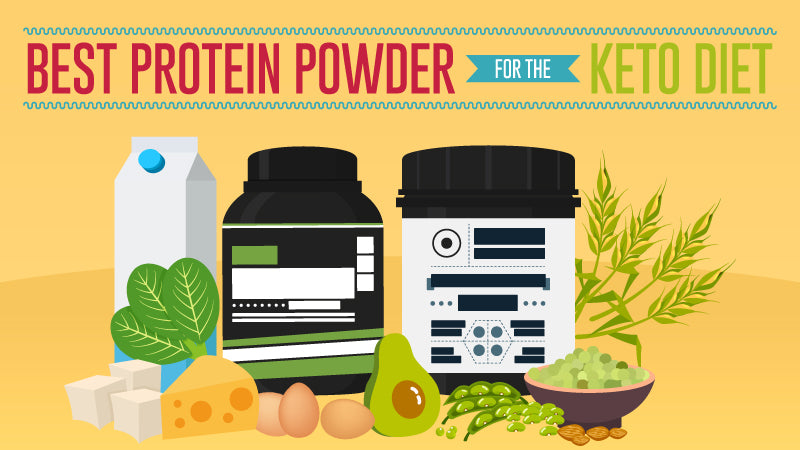
on October 01, 2019
This article isn’t about recommending certain brands of keto protein powder.
In this article we’re going to discuss the different kinds of protein powder that are readily available and how they stack up. We will briefly touch on why protein is important for the keto diet and then dive into comparing different types of protein:
- Bone broth protein
- Collagen protein
- Whey protein
- Plant based protein
- Egg protein
Keto Macros
Just a quick refresher, the ketogenic “keto” diet is a high fat, moderate protein, very low carbohydrate diet. The macronutrient breakdown for a standard keto diet is:
- Protein: 15-25%
- Fat: 75-85%
- Carbohydrates: 5-10%.
The goal is to shift the body from primarily using glucose as fuel to using fat or ketone bodies instead. But, in order to stay in ketosis, carbs must be kept very low. Increasing carbs too much, may kick you out of ketosis. But, what about protein? Can too much kick you out as well?
Low Carb Diets, Protein & Gluconeogenesis
There is a lot of confusion about protein and keto. Let’s start with a biochemistry lesson because those are always fun. Gluconeogenesis is the process by which the body makes new glucose from protein or fat.
Under extreme carbohydrate restriction, the body does still need a small amount of glucose to function. For example, the liver does not use anything other than glucose as fuel. This means some glucose is needed to keep certain bodily functions going, but it can make what it needs on its own through gluconeogenesis. But, the body doesn’t like to rely too much on gluconeogenesis, let’s look at why.
The brain, the most important organ in the body, needs about 130 grams of glucose per day to function. If the body needed to make this much glucose via gluconeogenesis, it would require about 160-200 grams of protein. It would be difficult to consume that much protein from the diet alone.
Therefore, the body would be forced to break down about 1 kg of muscle a day to get the protein it needed. This is not sustainable for any extended period of time, your muscles would completely disappear. Clearly, this isn’t happening on a keto diet.
Research has found that a low carb diet actually helps preserve muscle mass during weight loss, which means that the body isn’t using muscle for gluconeogenesis. While following a keto diet the body will only make the minimum amount of glucose needed, which it can do from the protein in your diet. For the other organs that usually run on glucose, it will switch to an alternative fuel source instead, known as ketone bodies.
Since protein is needed to make new glucose via gluconeogenesis, there are theories in the keto community that eating too much protein will kick you out of ketosis, due to glucose production. But, due to the mechanisms described above, the body doesn’t make glucose if it can use ketone bodies instead.
A study by the American Diabetes Association found that during a low-carb fasting period, 50 grams of carbohydrates were produced by the body in an 8 hour period through gluconeogenesis. Only 3 grams came from the protein that had been ingested during that time. Therefore, there is little concern that too much protein will kick you out of ketosis.
We also should mention that one of the reasons why the keto diet works for weight loss is due to the increase in protein intake. Protein is the most satiating macronutrient and is one of the primary reasons for the appetite suppression experienced on keto. Therefore, trying to limit protein may actually make sticking with keto harder.
How Much Protein Do You Need?
Now that you know you don’t need to restrict protein, how much protein do you need?
The Recommended Dietary Allowance (RDA) for protein is 0.8 grams/kg. This translates to 46 grams per day for women and 56 grams per day for men.
Most people don’t understand is that this number is the amount of protein needed to simply prevent muscle breakdown in a sedentary state. The RDA should really be seen as the minimum amount of protein an adult needs per day, not the goal. It does not account for physical activity, illness, growth, or other factors that can increase protein needs.
Adults need at least 30 grams of protein per meal to support muscle synthesis and promote satiety. This would translate to about 90 grams per day. Consuming this amount of protein spread out throughout the day may help with weight management as well.
Protein needs also vary based on activity level and goals. Athletes need between 1.2-2 grams/kg of protein. Strength athletes would want to eat on the higher end of that range, whereas endurance athletes should eat on the lower end.
For optimal fat loss, the recommendation increases even more to 1.8-2.7 grams/kg of body weight. If you are eating keto to promote weight loss, eating more protein, not less, can help maximize your success.
Types of Protein
So, which protein is best for keto? Hare a few of the most popular protein powders on the market and the pros and cons of each.
Collagen Peptides
Collagen peptides are one protein option that work for the keto diet. Collagen is the most abundant protein in the body. It is a structural protein that makes up all the connective tissues, such as skin, joints, and cartilage.
Collagen is made from the connective tissues of animals. It can be sourced from fish, cows, pigs, egg, or chicken. Each type of collagen has slightly different benefits. For example, bovine (cow) collagen is mostly type 1 and 3, which is the type of collagen in the skin. Chicken contains type 2 collagen, most beneficial for the joints.
As long as a collagen supplement has no added sugar it will be keto and Paleo friendly. Many products are just pure hydrolyzed protein, therefore will contain few other ingredients that would add carbs.
There are also some keto-specific collagen powders that combine MCT oil and collagen. These types of products are a good source of protein and the MCTs provide fast-acting energy. They are also slightly lower in protein than a standard powder, with 10 grams per serving. This type of product would work great as a pre-workout if you are on a keto diet. It would give you some fast-burning energy and protein to support your muscles.
The main drawback of collagen supplements is that they are not a complete protein. Collagen is lacking tryptophan, one of the essential amino acids. Therefore, it should not be relied upon as a primary source of protein.
Bone Broth Protein Powder
Another keto-friendly option is bone broth protein powder. This type of protein is made from boiling the bones, tendons and ligaments of animals, usually chicken or beef. The liquid that results is then dehydrated into a concentrated powder that can be mixed into a protein shake or food.
Bone broth pairs well with a keto or Paleo. If you are transitioning into ketosis or practicing intermittent fasting, it is a great way to boost your electrolytes and keep your energy up.
Bone broth powder is a complete protein, with all the essential amino acids. It is particularly high in the amino acids glycine, proline, glutamine, and arginine, which support immune function and digestive health. It is a great source of collagen as well.
Bone broth is a source of many minerals, including calcium, iron, potassium, and magnesium. It also contains glycosaminoglycans (GAGs) and hyaluronic acid for joint health. Since it does not contain lactose, it may be easier to digest than whey protein.
Bone broth powder can come either unflavored or is available in different flavors, such as chocolate or vanilla. It can be used in a variety of ways depending on the flavor or type. It can be mixed into a smoothie or if unflavored, added to favorite dishes or soups. Chicken has a meatier flavor than beef, but the type you choose depends on personal preference.
The potential drawback of bone broth protein powder is that it is more difficult to mix smoothly into certain liquids. It does form bubbles that may be unappealing to some. It is also usually more expensive than other types of protein powders.
Whey Protein
Whey protein is a popular protein choice made from one of the two proteins found in milk. It is a complete protein and is particularly high in branched-chain amino acids, making it a great choice for muscle building.
There are three main types of whey protein found on the market: concentrate, isolate, and hydrolysate. They vary based on how much they have been processed. Concentrate is the least processed, therefore it is lower in protein, but higher in fat and lactose. It usually tastes better than the other types and is less expensive. But because of the lactose (sugar) it contains, it is generally not keto friendly.
Isolate and hydrolysate are higher in protein and contain less lactose. Hydrolysate is the most expensive, but may also be the most beneficial of the three for building muscle due to the impact it has on insulin.
There are a few drawbacks with whey protein. It is not Paleo-friendly, since the Paleo diet does not include dairy products and it is made from milk. Many of the products on the market are high in carbohydrates, due to the lactose content, making them not ideal for keto either.
The lactose in whey can also make it hard to digest, as many people struggle with lactose intolerance. Allergies to dairy may also make whey not a feasible option.
Plant Based Proteins
Plant based protein powders are becoming more common due to the popularity of the vegan diet. These proteins can be made from a variety of sources including soy, brown rice, pea, hemp, or quinoa. Most products are a combination of two or more of these proteins. The reason is that on their own, they would not be a complete protein, but when combined they are.
Plant proteins are a great option for people with allergies, as pea and brown rice protein are hypoallergenic. They are also generally higher in fiber than animal-based proteins, although too much fiber can cause gas and bloating.
New research has found that pea and brown rice protein may be just as effective as whey protein for muscle building and weight loss. They are also lower in calories than many animal-based proteins.
There are a few cons to plant-proteins. They are highly processed, therefore may have many unwanted additives, sugar, or fillers. Depending on the product, they may not be keto-friendly.
Due to the level of processing, they are also usually more expensive. If they are made only from one source, such as brown rice, they are an incomplete protein without all the essential amino acids.
Egg Based Protein
Egg based protein powder is made from powdered egg whites. It is a complete protein, highly absorbable. It is almost as high in branched-chain amino acids as whey and may be equally as beneficial for building muscle. It is Paleo and keto friendly as it contains no carbs and usually has no additives or flavorings.
Since it is made only from egg whites, it is low in calories, making it a great protein choice if you want to lose weight. Unlike a whole egg, it is fat-free and cholesterol free.
The main downsides are that it doesn’t mix as well as other protein powders and may get clumpy. It is also not appropriate for people with egg allergies.
What to Look for In a Keto Specific Protein Powder
Now that you have a quick understanding of several different protein powders, what should you look for before making a purchase? Here are a few things to keep in mind:
- Total carbs. If you are trying to stick with a keto diet, you will have to eat between 20-50 grams of carbs per day. If a protein powder has 30 grams of carbs, it’s not going to work for your diet.
- Net carbs. If a protein powder is high in fiber, you can subtract the fiber grams from the total, giving you the net carbs. This is the number that counts for tracking your carbs on keto.
- Total protein. For muscle building after a workout, you want to look for a protein powder that has at least 20 grams of protein per serving.
- MCTs. These healthy fats can be readily used for energy when you are feeling sluggish, especially while transitioning into ketosis. Taking a protein powder with MCTs is a great option on keto.
- Other lifestyle goals. It is fine to use more than one type of protein powder. For example, collagen isn’t a complete protein, but is amazing for the skin. So you may want to alternate it with another protein choice.
- Taste. Sometimes we get so focused on health benefits that we forget food is supposed to taste good as well. Look for a protein powder that tastes great (or is at least tolerable) so you continue to drink it regularly.
These are just a few of the protein options that could work for a keto lifestyle. The bottom line is don’t be afraid of protein, it is unlikely to make you drop out of ketosis and could help you feel satisfied, so you are able to be more consistent with your diet.



